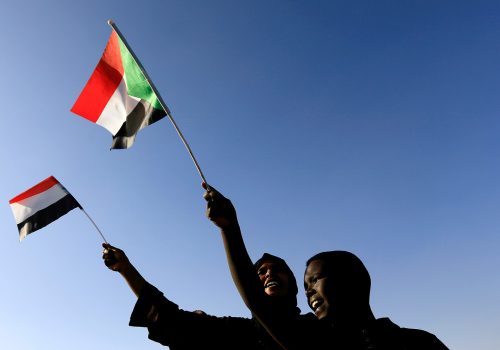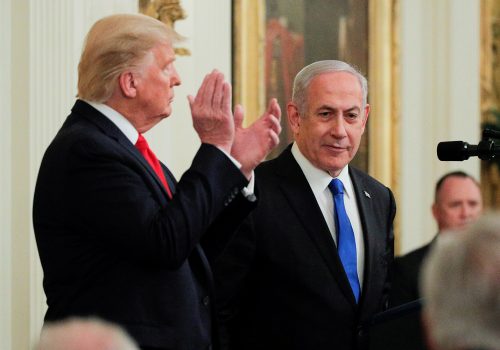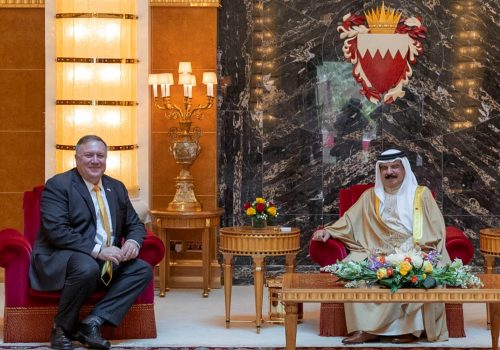Experts react: What the Morocco-Israel deal means for the Middle East
US President Donald J. Trump announced on December 10 that Morocco will become the fourth nation to normalize relations with Israel this year, notching another breakthrough for US diplomacy just weeks before Trump’s term as president comes to an end.
As part of the deal, Trump said the United States will recognize “Moroccan sovereignty over the Western Sahara,” a stretch of disputed land south of Morocco that is jointly claimed by the Moroccan government and the self-proclaimed Sahrawi Arab Democratic Republic. The United Nations has attempted to negotiate a settlement on the dispute, but Trump’s announcement means the United States will be the first Western nation to officially endorse Morocco’s claims.
Atlantic Council experts react to the deal between Israel, Morocco, and the United States, and what it means for the wider MENA region:
Jump to an expert reaction:
Karim Mezran: Morocco can claim victory, but potential conflict looms
Nabeel Khoury: Deal will not bring region any closer to peace
Carmiel Arbit: Deal could give Moroccan king new leverage
Shalom Lipner: Another political win for Netanyahu before Biden takes over
Sina Azodi: Mideast deal making is one of Trump’s legacies
Borzou Daragahi: A great deal for Morocco, but complications remain
Mark Katz: Don’t expect any more deals soon
Jonathan Ferziger: A nightmare for Palestinians
Morocco can claim victory, but potential conflict looms
“The announcement of the normalization of relations between the Kingdom of Morocco and the state of Israel is another positive step toward decreasing tensions in the MENA region, at least on the surface. The quid pro quo in this latest case, nevertheless, casts doubt on the agreement’s ability to achieve de-escalation, since the terms might well ignite a new conflict. In fact, with his recognition of Moroccan sovereignty over the Western Sahara territory, President Trump may provoke an armed reaction by the Polisario front in Western Sahara, and by its supporter, the Algerian state. Tensions in the area have been on the rise for some time, but this event may accelerate a renewed clash between the two Maghrebi states. In other words, this normalization in exchange for recognition of Moroccan claims over the Western Sahara will be a success for the Moroccan monarchy if it does not plunge it into a military confrontation with Algeria.”
Karim Mezran, director of the North Africa Initiative and resident senior fellow with the Rafik Hariri Center and Middle East Programs.
Deal will not bring region any closer to peace
“The agreement is yet another transactional deal that benefits the leaders of the United States, Israel, and Morocco over a piece of land that does not belong to them. Once again, Trump cedes territory (an executive action on his part without any debate in Congress) which he does not own without even a discussion with, let along an agreement from, the Sahrawi people who have fought long and hard for self-determination. In the end, the King of Morocco revived a diplomatic relationship that his father had established after the 1994 Casablanca conference.”
“Trump has once again disregarded three decades of US and UN diplomacy that sought via referendum and consultation to come to a peaceful resolution of the Western Sahara dispute. This decision was made on the day the world is supposed to celebrate international human rights. In the name of peace (inadequate though it may be) harm was done to yet another indigenous people, and it will not bring the people of the region any closer to genuine peace.”
Nabeel Khoury, nonresident senior fellow in the Atlantic Council’s Middle East programs.
Deal could give Moroccan king new leverage
“Peace between Morocco and Israel is a welcome addition to the Abraham Accords. The announcement is not surprising: ties between Israel and Morocco have been relatively strong for decades. Morocco was a one-time hub of Jewish life in the region and the King has increasingly embraced Jewish Moroccan heritage, naming senior Jewish advisers to his government and, most recently, incorporating Moroccan Jewish history into school curricula. There is already more than $30 million in annual trade between the two countries, tens of thousands of Israelis travel to Morocco annually, and Israelis from Morocco can already retain Moroccan citizenship.”
“The deal is expected to also include US recognition of Moroccan control over the Western Sahara—which Morocco has sought for half a century. After seven successive US presidents insisted on neutrality, such an offer from Trump, no matter how short-lived, is surely too great to pass up on.”
“The Palestinians will undoubtedly feel deeply betrayed by the announcement, particularly given widespread Moroccan support for the Palestinian cause. But Morocco has helped lead Arab peace initiatives with Israel in the past, and the King has used his seat as chair of the Al-Quds Committee of the Organization of Islamic Cooperation to advocate for a Palestinian State in the past. The agreement could give the King further leverage to advance Palestinian issues—should he choose to use it.”
Carmiel Arbit, nonresident senior fellow in the Atlantic Council’s Middle East programs.
Another political win for Netanyahu before Biden take over
“The announcement of Morocco’s plans to normalize its ties with Israel—with which it has a long history of “on again, off again” relations —comes on the heels of similar deals involving the UAE, Bahrain, and Sudan. It offers the latest representative example of President Donald Trump’s original paradigm for peace between Israel and the Arab world. Turning conventional wisdom on its head, Trump has refuted the previous assumption that Israel’s integration into the Middle East would be achieved only through resolution of its conflict with the Palestinians, instead employing the leverage of American largesse—e.g. sophisticated weaponry to Abu Dhabi, removal from the State Department’s list of terrorist sponsors for Khartoum and now, recognition of Rabat’s claim to Western Sahara—to incentivize Arab leaders into accepting Israel as their diplomatic partner. The success of this approach is self-evident.”
“Netanyahu, who has been a famous backer of Trump and (most of) his foreign policy initiatives, is reaping the fruits of his enthusiastic investment in the outgoing administration. The Israeli prime minister’s deferential attitude toward Trump—extending also to the Israeli government’s muted congratulations for President-elect Joe Biden and open criticism of his intention to reverse Trump’s rejection of the nuclear deal with Iran—continues now to deliver gains for Israel from the current president who, in the twilight of his tenure, is eager to add notches to his belt, most particularly ones which appeal to the conservative and religiously devout constituency upon whose support he would depend in mounting an anticipated bid to recapture the White House.”
“This window may be closing. With the Biden administration less likely to submit to these kinds of quid pro quos, and few among Israel’s center-right majority inclined toward compromise with the Palestinians, it remains to be seen whether conditions will induce other Arab nations to jump on the bandwagon of normalization with Israel after January 20.”
Shalom Lipner, nonresident fellow in the Atlantic Council’s Middle East programs.
Mideast deal-making is one of Trump’s legacies
“The news should be analyzed in the context of Trump administration’s transactional foreign policy. Over the past few months, and having failed to achieve any success with regards to US policy toward North Korea or Iran, the Trump administration seems to have focused itself on convincing Muslim majority countries with no democratic institutions to establish relations with Israel, in return for either weapons or more recognition from the United States. The Trump administration can sell this as a foreign policy achievement and, upon leaving office, can be viewed as his foreign policy legacy.”
Sina Azodi, nonresident fellow in the Atlantic Council’s Middle East programs.
A great deal for Morocco, but complications remain
“The United States is recognizing Moroccan claims over the disputed territory of Western Sahara and weighing in on one of the longest-running frozen conflicts in the world in exchange for Rabat committing to normalize relations with a country with which it has never been at war and with which it has had secret relations for decades. Israeli passport holders have been able to visit Morocco for years, obtaining visas on arrival.”
“This is a great deal for Morocco, but one that complicates longstanding efforts to resolve the dispute over Western Sahara. It is also a deal that could easily damage relations between Washington and Morocco’s well-armed gas- and oil-rich neighbor, Algeria, which hosts the Sahrawi rebels of the Polisario Front. Many countries of the world recognize Sahrawi rule over at least part of the disputed phosphate-rich territory.”
Borzou Daragahi, nonresident senior fellow with the Atlantic Council’s Middle East programs.
Don’t expect any more deals soon
“As predicted in September, a normalization agreement has now been signed between Morocco and Israel. But there may not be many more such agreements. Governments strongly influenced by Iran (Iraq and Syria) and Hezbollah (Lebanon) will not normalize relations with Israel. Algeria probably would not have anyway, but it definitely will not do so now that the Trump administration has sided with its rival Morocco over Western Sahara. Such a move would also be difficult for Tunisia and Kuwait which are more constrained by public opinion than other Arab governments. King Salman has made it known that he opposes such a move by Saudi Arabia, and Qatar has indicated that it will not enter into such an agreement either. Oman seems to be the most likely prospect for normalizing relations with Israel, but it may be content with the current status quo of quiet cooperation with the Jewish state.”
Mark N. Katz, nonresident senior fellow with the Atlantic Council’s Middle East programs.
A nightmare for Palestinians
“For Palestinians, President Donald Trump’s departure from the White House can’t come soon enough. Morocco’s decision to restore and upgrade diplomatic relations with Israel showed that Palestinian Authority President Mahmoud Abbas’s nightmare hasn’t ended with the election of a far more sympathetic Joe Biden. Indeed Trump predicts more governments will soon break ranks with Abbas and join the wave of Arab states warming up to Israel.”
“Like the United Arab Emirates, Bahrain, and Sudan, which have normalized ties with Israel since September, Morocco’s King Mohammed VI professed deep concern for the Palestinians and pledged to work harder for a comprehensive Middle East peace agreement. In Ramallah, they weren’t reassured. Former Palestinian negotiator Hanan Ashrawi condemned the deal in a tweet, saying: “Between bribery and blackmail, the Trump administration is in a mad scramble to extract concessions and benefits for Israel before the new administration takes over.”
“Even under Biden, Palestinians have slim hopes for getting what they want. While the president-elect may restore hundreds of millions in aid money that Trump cut off and allow Palestinians to reopen their shuttered representative office in Washington, the US Embassy that was moved from Tel Aviv to Jerusalem will stay put despite Palestinian protests over the city’s political status. To the Palestinians’ disappointment, Biden has praised the new willingness of Arab states to come to terms with Israel and will certainly encourage the trend as he takes over the reins of Middle East policy in Washington next month.”
Jonathan Ferziger, nonresident senior fellow with the Atlantic Council’s Middle East programs.
Further reading:
Sign up for all the latest updates!
Sign up for the MENASource newsletter, highlighting pieces that follow democratic transitions and economic changes throughout the region.
Image: Israel's Prime Minister Benjamin Netanyahu stands with U.S. President Donald Trump after signing the Abraham Accords, normalizing relations between Israel and some of its Middle East neighbors, in a strategic realignment of Middle Eastern countries against Iran, on the South Lawn of the White House in Washington, U.S., September 15, 2020. Via REUTERS/Tom Brenner/File Photo


